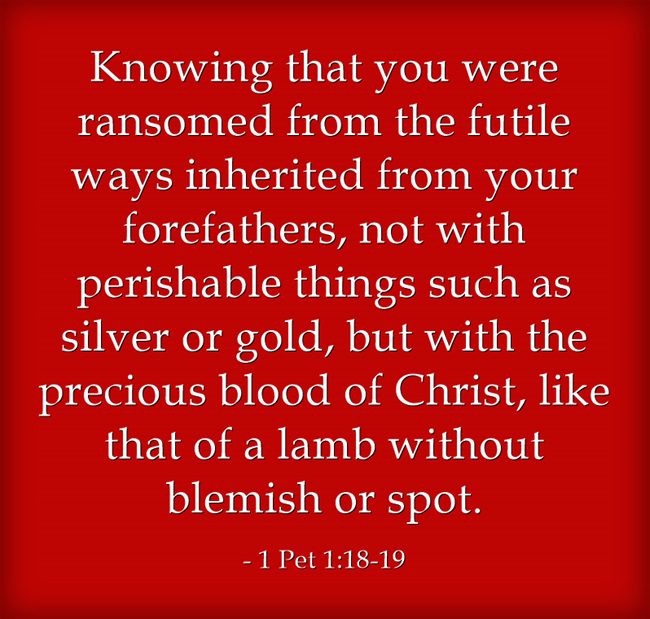Here is a Bible study and commentary on the first chapter of 1st Peter.
First Peter 1:1-2 “Peter, an apostle of Jesus Christ, To those who are elect exiles of the Dispersion in Pontus, Galatia, Cappadocia, Asia, and Bithynia, according to the foreknowledge of God the Father, in the sanctification of the Spirit, for obedience to Jesus Christ and for sprinkling with his blood.”
The Apostle Peter was writing to the Jews who had been dispersed or exiled out of Jerusalem and Judea, and wrote to comfort them by telling them that they are the elect of God who were chosen “according to the foreknowledge of God the Father,” and not according to their own wisdom. These saints of God have been sanctified by the blood of the Lamb of God for the purpose of living in “obedience to Jesus Christ.”
Why were the Jews dispersed?
Was their dispersion foreknown to God?
First Peter 1:3-5 “Blessed be the God and Father of our Lord Jesus Christ! According to his great mercy, he has caused us to be born again to a living hope through the resurrection of Jesus Christ from the dead, to an inheritance that is imperishable, undefiled, and unfading, kept in heaven for you, who by God’s power are being guarded through faith for a salvation ready to be revealed in the last time.”
Peter focuses on the reason that we have been saved and it is “According to his great mercy” that God “had caused us to be born again to a living hope” which is through the resurrection of Jesus Christ, and since He was raised from the dead, so too shall our mortal bodies put on incorruption someday (1st Cor 15:53). Our inheritance isn’t like the worlds where people fight over it and can lose it, but our inheritance is imperishable and is presently being “kept in heaven for you” and is being guarded “by God’s power.” In other words, it is untouchable.
What is the believer’s inheritance?
Why is it kept in heaven?
First Peter 1:6-7 “In this you rejoice, though now for a little while, if necessary, you have been grieved by various trials, so that the tested genuineness of your faith—more precious than gold that perishes though it is tested by fire—may be found to result in praise and glory and honor at the revelation of Jesus Christ.”
Peter moves from the assurance of their salvation to the fact that they are secure in Christ. That means they are preserved in heaven but Peter also assures them that they will suffer, because it may be necessary to have their faith tested to see if it’s the real thing (genuineness), but this testing is like gold that passes through the fire; it makes it more precious. That’s why Peter wants them to realize, “Though you do not now see him, you believe in him and rejoice with joy that is inexpressible and filled with glory, obtaining the outcome of your faith, the salvation of your souls” (1st Pet 1:8-9).
Is suffering a good thing according to God?
Why is our faith tested by fire?
First Peter 1:10-11 “Concerning this salvation, the prophets who prophesied about the grace that was to be yours searched and inquired carefully, inquiring what person or time the Spirit of Christ in them was indicating when he predicted the sufferings of Christ and the subsequent glories.”
Peter understood that all of the Old Testament prophets had been writing about the coming Messiah, like Isaiah the Prophet who foretold Jesus suffering (Isaiah 53), as “he predicted the sufferings of Christ” but also, the subsequent glories. No wonder these are “things into which angels long to look” into (1st Pet 1:12).
Who else can you think of that prophesied about Jesus’ coming?
Why are the angels curious about salvation?
First Peter 1:14-16 “As obedient children, do not be conformed to the passions of your former ignorance, but as he who called you is holy, you also be holy in all your conduct, since it is written, “You shall be holy, for I am holy.”
Peter writes something very similar to what the Apostle Paul wrote in that we should “not be conformed” (Rom 12:2)to this world, and specifically, do not be conformed to our former way of life because God has called us to be holy, just as He is holy. This holy living is how we conduct our lives. At one time, these former passions kept us in ignorance, but after we are saved, God’s Spirit has revealed the holiness of God and God’s desire that we too live lives that are pleasing to God. Not a life of perfection, since that’s not possible, but a life that strives to obey God and please Him in all we do.
How can we be holy if we are still going to sin this side of the kingdom?
Why are we often told to not be conformed to this world, including our passions?
First Peter 1:18-21 “Knowing that you were ransomed from the futile ways inherited from your forefathers, not with perishable things such as silver or gold, but with the precious blood of Christ, like that of a lamb without blemish or spot. He was foreknown before the foundation of the world but was made manifest in the last times for the sake of you who through him are believers in God, who raised him from the dead and gave him glory, so that your faith and hope are in God.”
Peter ties in God’s desire that we live holy lives to the fact that we were ransomed from the god of this world and his futile ways, just as the ancient Israelite forefathers had been from brought out of Egypt, but not with things like gold and silver. In fact, there is nothing more precious in all the universe than the precious blood of the Lamb of God, Who is “without blemish or spot.” That’s Who our “faith and hope” is in.
Why does it say the Jews were ransomed from their futile ways?
How was Jesus Christ made manifest or known to you?
First Peter 1:22-23 “Having purified your souls by your obedience to the truth for a sincere brotherly love, love one another earnestly from a pure heart, since you have been born again, not of perishable seed but of imperishable, through the living and abiding word of God.”
After we have put our trust in Christ, God sees it as having our souls purified, and this should naturally produce obedience in us, and since we’ve been born again of an imperishable seed, the Holy Spirit, we are to earnestly love one another out of sincere or pure desire to serve God and please Him, and when we love one another, we prove that we are Jesus’ disciples (John 13:35).
How can obedience purify our souls?
What does Peter mean to love the brothers earnestly?
First Peter 1:24-25 “All flesh is like grass and all its glory like the flower of grass. The grass withers, and the flower falls, but the word of the Lord remains forever. And this word is the good news that was preached to you.”
In these final verses of 1st Peter chapter one, the apostle reminds us of the fact that we are no better than the grass of the field. It’s beautiful in the beginning, but as time passes, it fades away and passes, but those who are born again, not so. The Christ follower knows that God’s Word remains forever and doesn’t change with seasons and times. That’s the very same gospel or “good news that was preached to you” and is found in the Word of God and is still being preached today.
What is the summation of the “good news?”
Why does Peter compare our life with the grass of the field?
Conclusion
This letter from Peter is still just as relevant today as it was in the day in which it was written because God’s Word remains forever and it contains the good news of the gospel of Jesus Christ which gives sinners hope that they can be “born again of an imperishable seed, the Holy Spirit” and redeemed by God through the precious blood of the Lamb of God, Jesus Christ.
Article by Jack Wellman
Jack Wellman is Pastor of the Mulvane Brethren Church in Mulvane Kansas. Jack is also the Senior Writer at What Christians Want To Know whose mission is to equip, encourage, and energize Christians and to address questions about the believer’s daily walk with God and the Bible. You can follow Jack on Google Plus or check out his book Teaching Children the Gospel available on Amazon.












